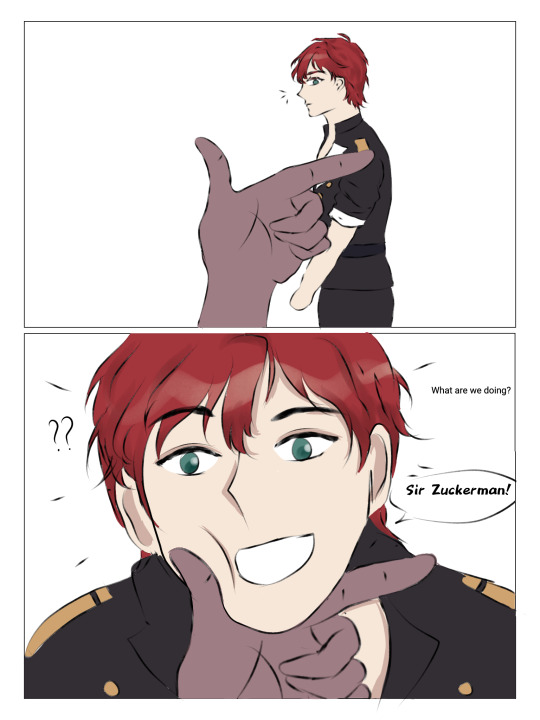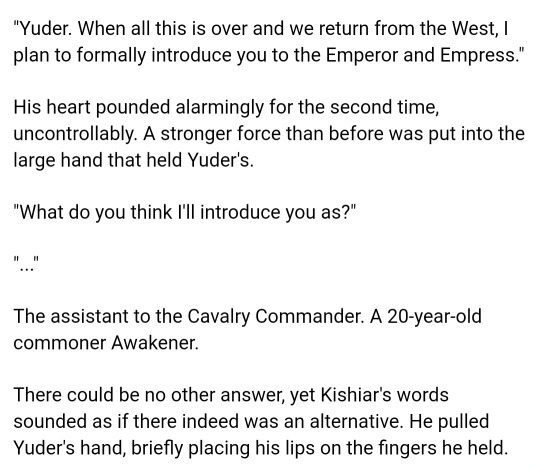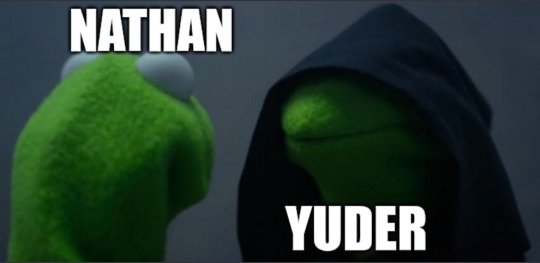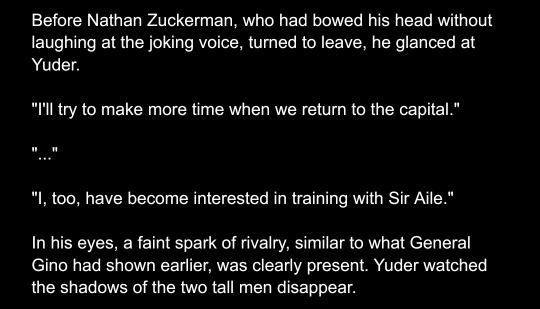#Nathan Zuckerman
Explore tagged Tumblr posts
Text
TURNING FAN WEEK💛
DAY 1: Genderbend + Alpha!Yuder

BONUS (since i had time and i wanted to do it):

The fanweek is finally here!! Aaahhh i was preparing for months!! I'm glad i was able to do It!
PS: I drew so many males lately that i didn't know if i was able to do a good female version of them but... I think i did well ✨
PPS: Fem Kishiar was the most difficult to figure out 😭 BUT IN THE END, we have our Golden Queen 🧡👑
#turning by kuyu#turning novel#turning manhwa#터닝#yuder aile#kishiar la orr#kishiar x yuder#nathan zuckerman#gakane bolunwald#Enon#turning fanweek 2025#turning fanweek#genderbend#Alpha!Yuder#Female Yuder#Female Kishiar#Onestly i can't choose my favourite#They're all queens and slay so much#Spotify
75 notes
·
View notes
Text
honestly early chapters Nathan deserves more credit considering how much bullshit he has to put up with from Kishiar’s side
being told the just off age commoner is hot
the weird commoner has to be a spy because he’s entirely too good at everything
Kishiar not leaving the suspicious guy alone
Fucking assassination attempt he wasn’t there for and the incredibly fucking weird powerful commoner dealt with on his own
Looking after the cavalry while Kishiar is doing hot girl shot
Kishiar using the powers to fix the commoner’s weird funky wound
Like I’m only praying he never learns about the whole ‘propositioning Yuder to see how he reacts’ thing bc while I think Nathan is too professional to slap Kishiar, I think he would oversteep his tea
359 notes
·
View notes
Text
Imagining what Ever and Nathan were up to in the first timeline after Yudrein's execution.
Did they happen to meet each other? Did they bond over the feeling of failing someone they were supposed to support with all their might? Did they both despise the empire they were once proud to serve?
Did they rebel?
#터닝#turning by kuyu#turning#ever beck#nathan zuckerman#i have this headcanon that they became the de facto leaders of a rebellion against the empire#and that things got slightly better before getting much much worse#and that they both experienced what their predecessors did#and they gained a painful understanding of what it was like to lead others only to watch everything fall apart regardless of their efforts#hyst yells into the void#that's my queue
48 notes
·
View notes
Text
Nathan saw his master trying this on Sir Aile two days ago (It did not look like he succeeded in whatever he was trying to achieve)

#natkane#has this been done before??#nathan zuckerman#gakane bolunwald#turning#nathan doesnt know what theyre supposed to be doing either#but he feels extremely pleased nonetheless#i am half asleep lol#going to snork mimimi land#doodles#터닝
51 notes
·
View notes
Text
I SO FREAKING CAN'T WAIT! I knew I could count on Princess Kishiar 💜💜💜😭💜😭💜😭😭💜💜💜
Also he knows both his assistants SO WELL xD


21 notes
·
View notes
Text
Kishiar being Kishiar (novel spoilers!!!)








HOW CAN A MAN LIKE THIS EXIST?!?! AAAHHHHH. (Read turning if you haven't yet, join the discord server if you haven't yet^-^)
#turning by kuyu#turning#turning bl#turning novel#yuder aile#kishiar la orr#Nathan Zuckerman#im mentally unstable about them#KishiYu#kishiyu#koream novel#korean bl#yaoi bl#yaoi novel
168 notes
·
View notes
Text
Spoilers Ch. 1130
Yuder coming for food during Kishiar’s rut be like:

#turning#turning novel#turning memes#터닝#yuder aile#kishiyu#kishiar la orr#kishiar x yuder#nathan zuckerman#turning by kuyu
37 notes
·
View notes
Text

This sentence explains Nathan so much I love it
36 notes
·
View notes
Text
NatYu fic extra thoughts
Fic in question: https://archiveofourown.org/works/64951624
Ok so I noticed that Yuder is super passive in his friend-making while thinking about all the relationships in Turning—sure, he picked up Sunz and Emon, but that was for work purposes. Same for the Cavalry with friendship by proxy. So, without that utilitarian drive for friendship, or proximity creating closeness, Yuder’s very much out of his depth when it comes to showing his interest in friends/lovers/etc. It sounds like in 1TL, his first crush on Kishiar started out as a kind of puppy love; showing enthusiasm in training, hoping for recognition and praise, the faintest romantic spark before it got crushed by his manifestation. Ejain, if memory serves, showed interest first in Yuder. Enon was probably a proximity-fueled siblinghood.
Yuder has no real reason to be close to Nathan other than shared missions and Kishiar as a central topic, and I have faith in Yuder (or Enon, hearing about this as a fed-up hyung) to realise that building a relationship based on a third party, no matter how close they both are to that third party, is certainly not ideal. I think Yuder could have genuine interest in Nathan on a technical level that expands into personal interest, like a much more jaded, mature version of his 1TL crush on Kishiar. At the same time, I think it’s really fucking funny that Nathan still thinks Yuder is 21 (when this fic is set). He's probably thinking something like, 'why tf is this 21-year-old, barely an adult really, already so gone on my liege??? Concerning.'
19 notes
·
View notes
Text
I love a Gakane POV in my life but this just sounds very, very funny.

#what the hell sure#i mean...??#and ykw hell yeah#gakane bolunwald#nathan zuckerman#turning novel#터닝#turning by kuyu
51 notes
·
View notes
Text
These last few chapters of Turning have really made me understand the ship Nathan x Gakane. I wasn't feeling it at first, buuut damn they are actually so cute together.
#just adding this to my collection of turning ships#turning#turning novel#turning by kuyu#nathan zuckerman#gakane bolunwald
16 notes
·
View notes
Text

🎻Nathan Zuckerman🎻
I love to think he continued to study violin not only because Kishiar dragged him into It, but maybe because he actually enjoy It 🎶🎵
#turning by kuyu#turning novel#turning manhwa#터닝#nathan zuckerman#the most talented man in this world (after his lord)#drawing someone playing the violin is more harder than i thought#but i had the approvation of three violinists so i'm proud of myself#A MAAAN A MAAAN#husband material for real
80 notes
·
View notes
Note
"This loyal knight had helped clean up the mess following the manifestation of his second gender, and there had even been a one-on-one duel between them when he had defied Kishiar.
'A significant incident where both of us ended up wounded, and I discovered that Nathan Zuckerman was a hidden Swordmaster.'
-- screaming. I need more details on the duel but also the fact Nathan had to clean up the whole heat fiasco is so juicy just in terms of like, character dynamics and perspectives n such

oh you're going to love some of the Nathan and Yuder interactions to come (they get a whole mission to themselves that's just. a riot imo).
But yeah, I really love how thisd also shows their different concerns?
Like, I'm sorry but first timeline Nathan had to deal with the aftermath of Yuder's second gender manifestation, Kishiar dying, Kishiar making his situationship his successor, the fact that there was a situationship at all - and teaching this 20-21 year old kid how to act like a noble in a year. Bestie was beyond overworked.
And now here in the second timeline, he spends most of the first half telling kishiar to not fuck the spy to be more careful around a highly suspicious individual - and Nathan is right btw!!! Yuder is sus af.
But watching him, he actually comes to like him. they bond over mutual worry for what the fuck kishiar is doing to himself.
57 notes
·
View notes
Text

Same, Nathan. Same
16 notes
·
View notes
Text
Did I ever tell you I love Nathan and Yuder's friendship? What? I did a thousand times already? Well, get ready for the 1001th time buddy CAUSE IT'S LIKE YUDER IS TALKING TO A MIRROR!!!

ngl the sparring with Meghna was cool but I want to see these 2 fight. For uhm... educational purposes. Kuyu-nim i beg you 🙏

Don't tell me you don't see it??? THEY'RE TWINS YOUR HONOR! Kishiar collecting autistically-obsessed-with-the-sword silently-brooding dark-haired with-the-warmest-hearts cuties i see youuuu
edit: I'M FREAKING LOSING MY MIND ARGAHDAAGEAFAFSAFKAJAAHFSFHJSHAFJAHAGSDSFA

35 notes
·
View notes
Text
After one too many personal training sessions




#GUESS WHO HAS A NEW PAIR OF MEW MEWS (to torment) TO DRAW FANARTS OF <333333#They started living in my head rent free ever since I saw that au#😭😭😭💕💕💕💕💕💕#Lyft and Sharu's big brain time#turning#turning fanart#Nathan Zuckerman#gakane bolunwald#터닝#NatKane
43 notes
·
View notes